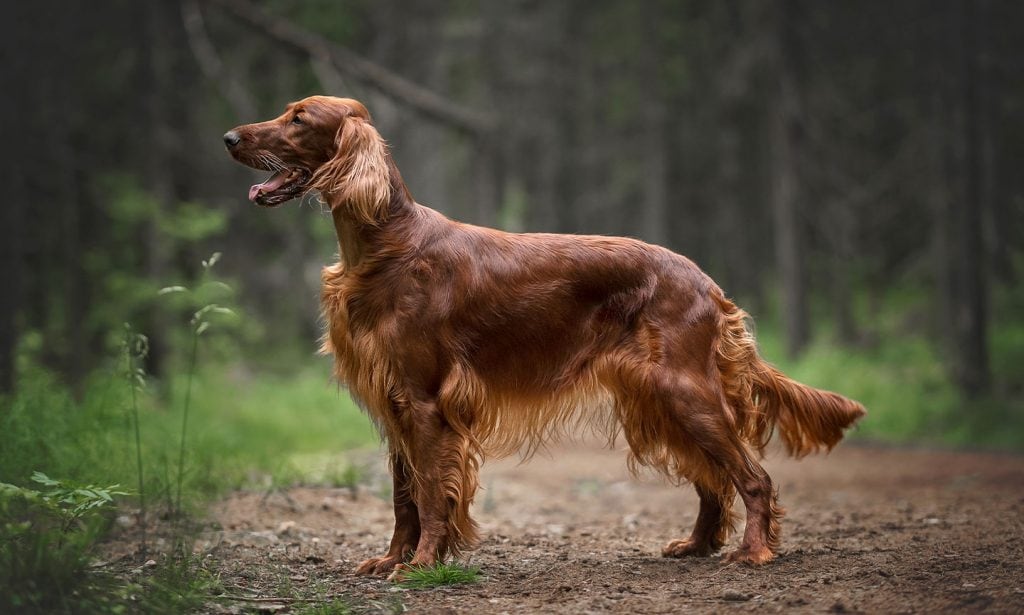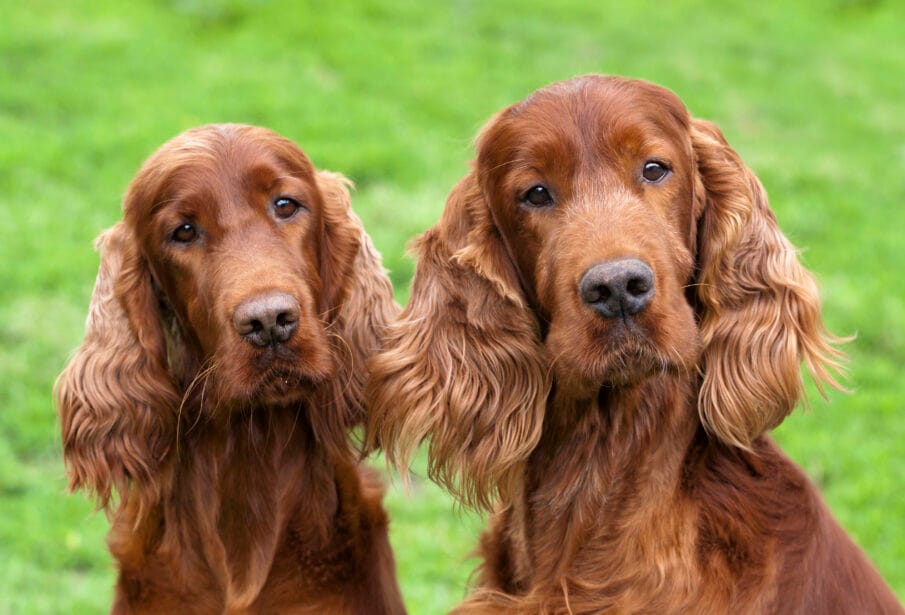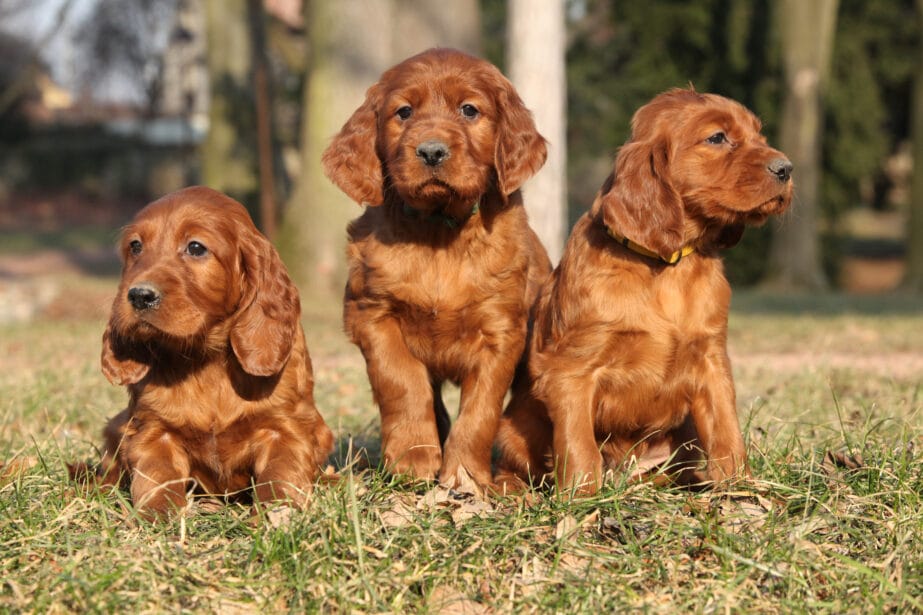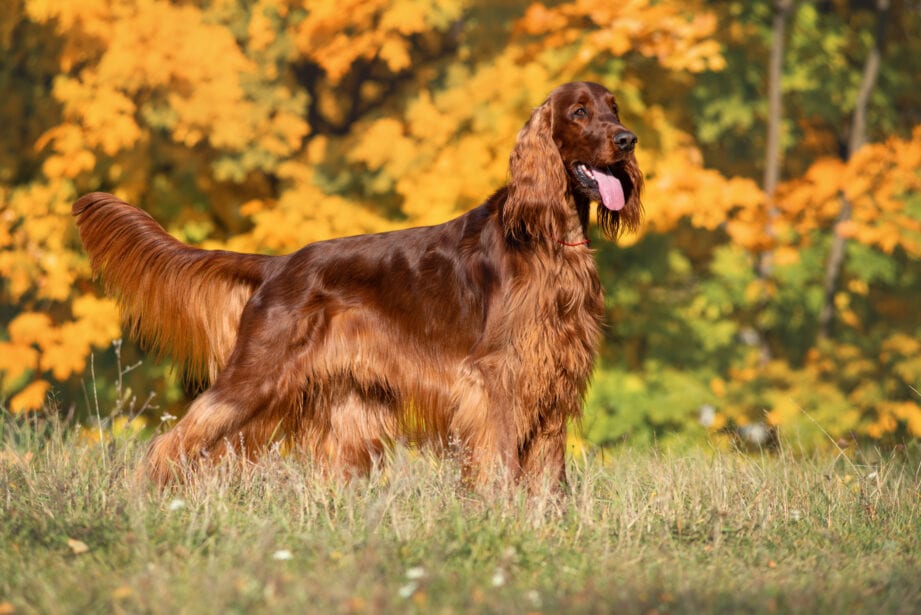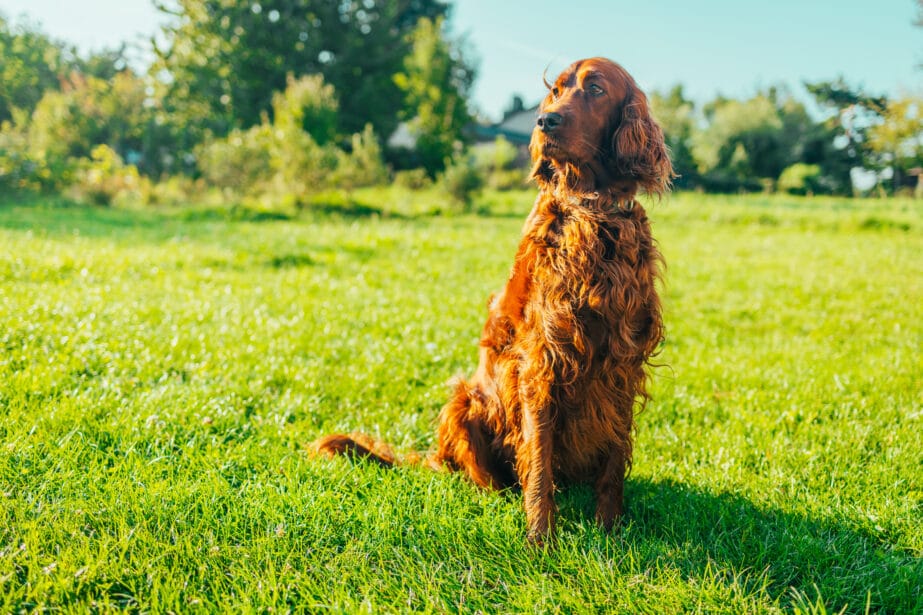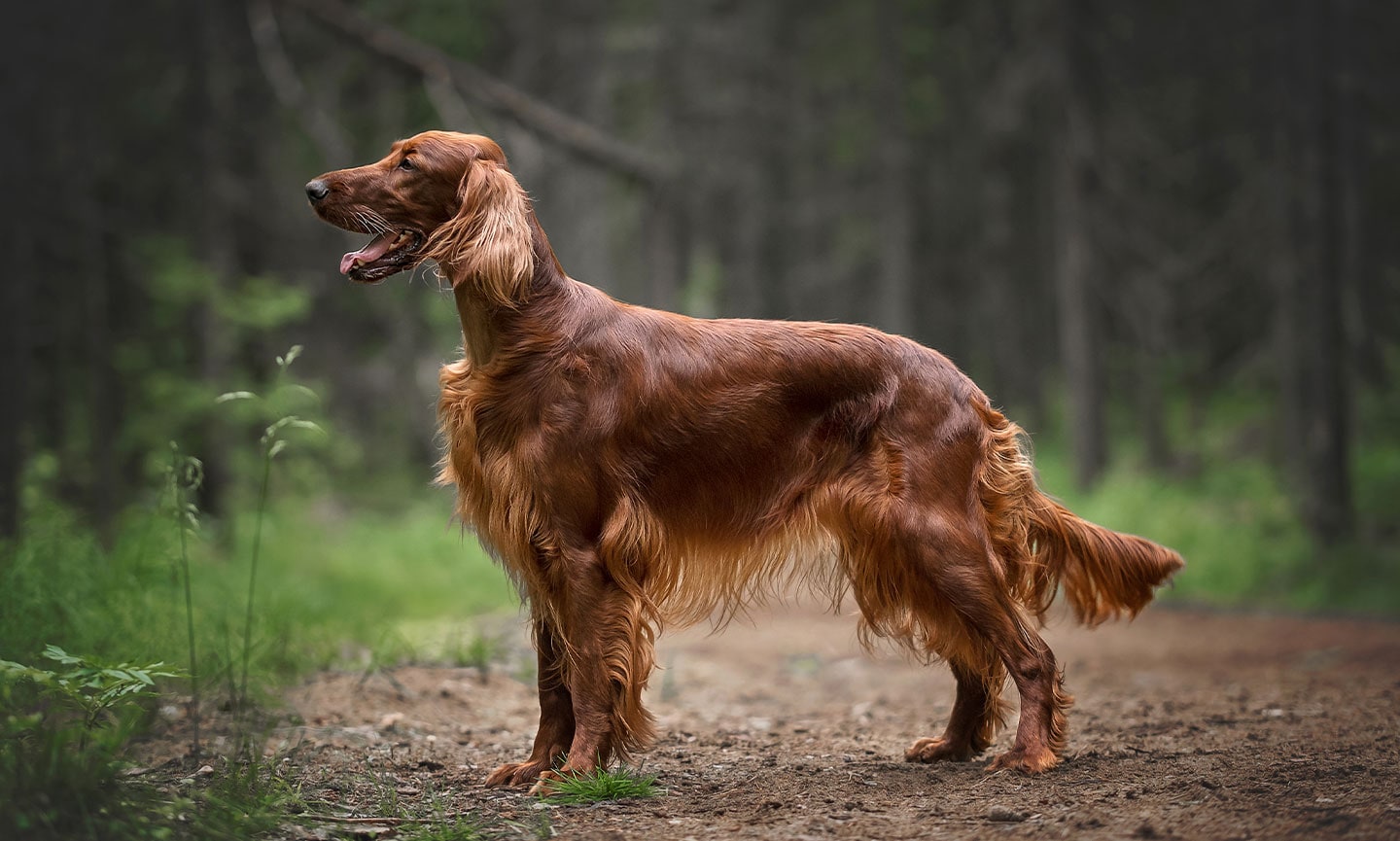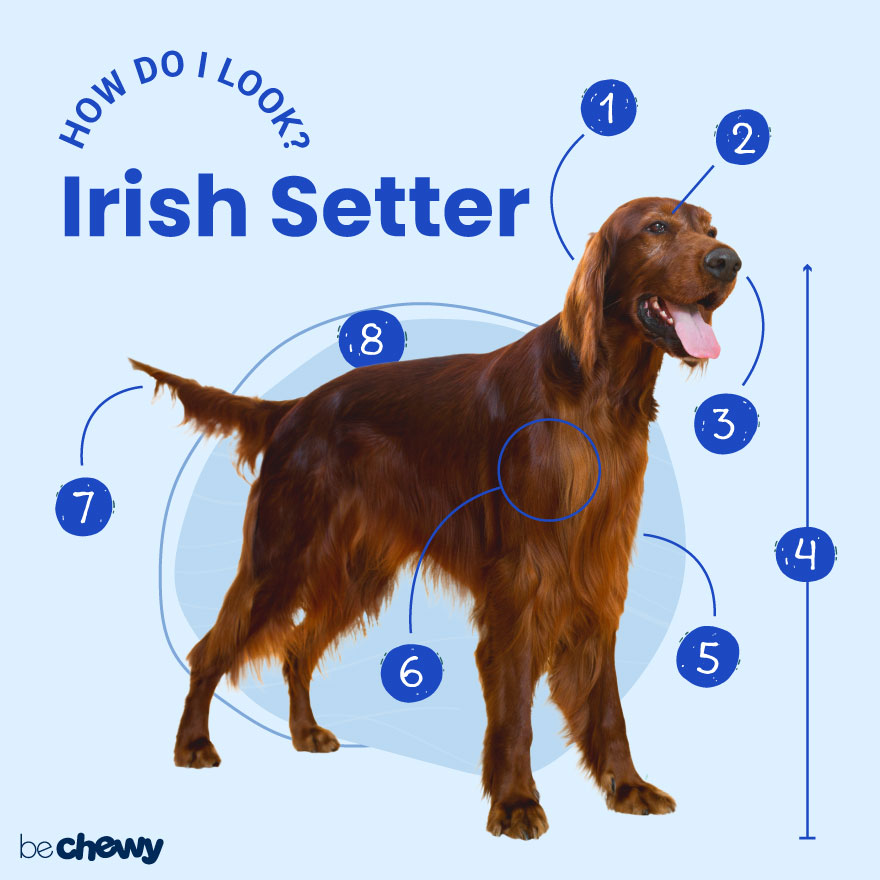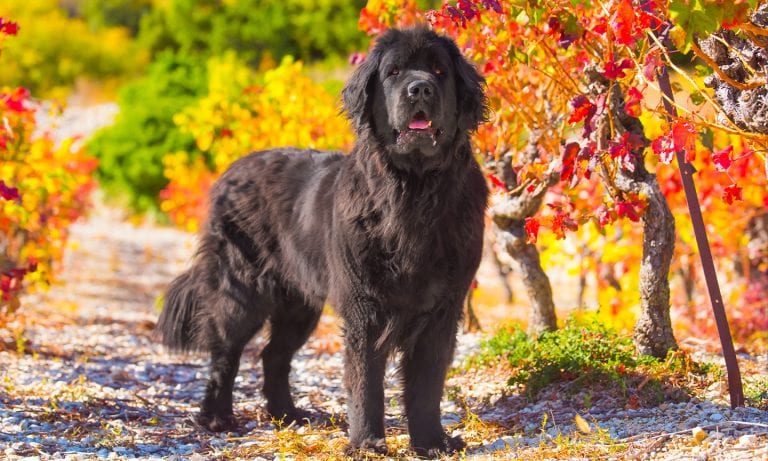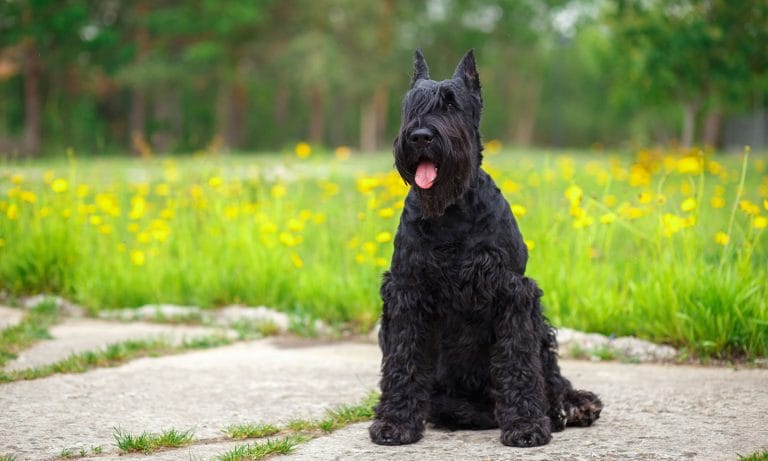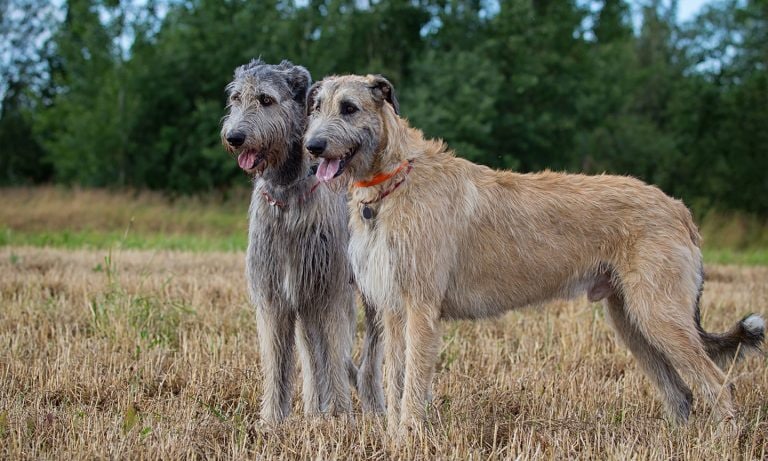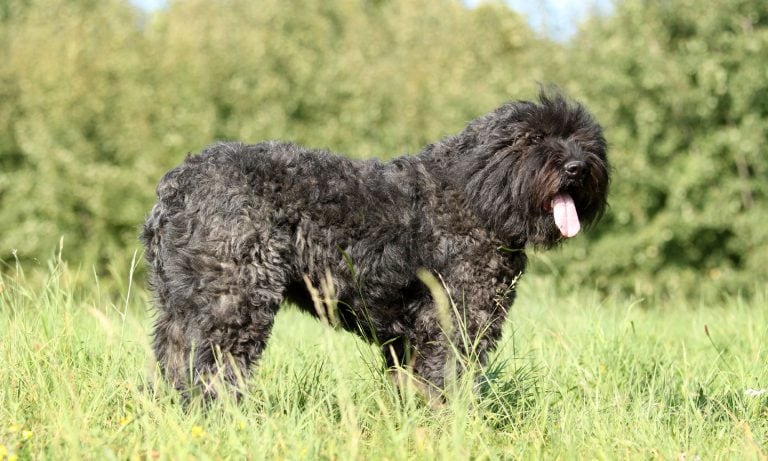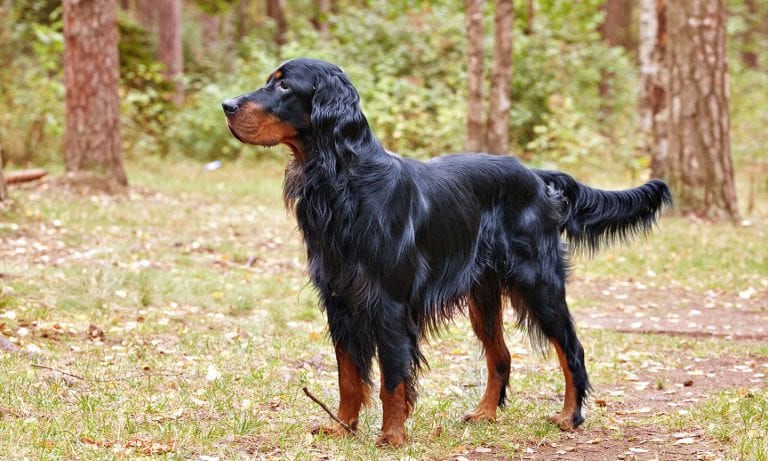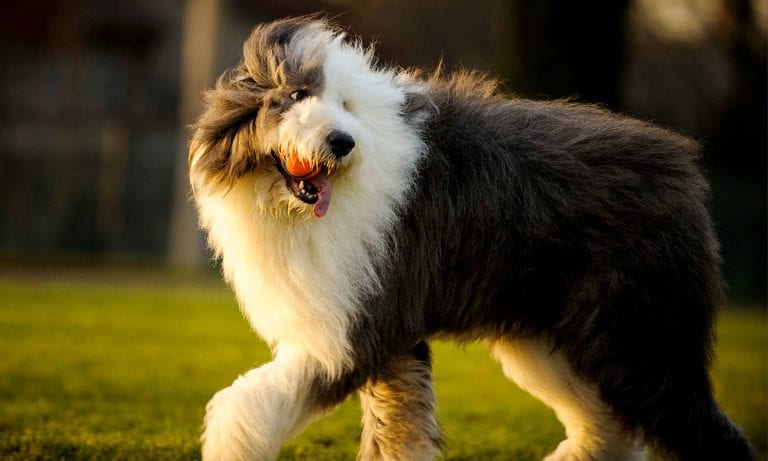A rambunctious redhead, born to run and with a sweet, goofy streak, Irish Setters are friend to all they meet and up for anything you love to do. Magazine-cover gorgeous and intelligent with an alert personality and outgoing manner, they’re your new best friend as long as you can give them the attention and exercise they need to burn through all of that energy. Cat, other dogs, kids? Not a problem. We love everyone! So, not the best choice for a guard dog (unless tail-wagging can be considered a weapon) or in a situation of being left alone for most of the day. If you have the time and energy to keep up and enjoy meeting strangers who will want to love on your dog, an Irish Setter might be the pooch for you.
Breed Snapshot
Temperament:
LovingGoofyCuriousCoat Color:
MahoganyChestnutRed
Best For
Irish Setters are energetic and friendly dogs known for their rich, reddish coats and friendly disposition. They thrive in active homes with pet parents who appreciate their playful nature and can provide plenty of physical and mental stimulation.
Irish Setter Temperament
The Irish Setter breed is known for being energetic and friendly. You’d be hard-pressed to find an Irish Setter who’s shy and withdrawn or one who’s aggressive and hostile. This breed is happy-go-lucky, ready to romp with your kids in the backyard or keep you company in the house. The Irish Setter wants to be by your side at all times. Their gentle, loving and playful personality makes them a great fit for families. Because of these traits, they’re also wonderful therapy dogs who can brighten up a hospital room or nursing home.
Irish Setters love children, and their goofy nature will keep your kids entertained. These fiery redheads are also very comfortable with strangers (hello, life of the party!) and good with other pets, especially other dogs or cats. Just be careful with pet birds—since Irish Setters were bred to hunt birds, their prey drive might get them in trouble.
Affectionate, playful and devoted are some of their main characteristics. But Irish Setter dogs also have a mischievous streak: they’re fun-loving and curious, and definitely not above getting into a little trouble. The breed is slow to mature, meaning their playful puppy personality stays around a little longer than most dogs. At the end of the day, though, an Irish Setter’s temperament is sweet and loving—and their desire to please their pup parent is one of the best qualities Irish Setters possess.
How to Care for a Irish Setter
Bringing an Irish Setter into your family requires a significant time commitment. Between grooming them multiple times a week, wearing them out with walks and games and providing enough mental stimulation to keep them out of trouble, an Irish Setter will definitely keep you busy. Here’s your 101 guide to caring for your Irish Setter dog.
Irish Setter Health
Irish Setters have a life expectancy of 12 to 15 years. In general, Irish Setters are a healthy breed, with only a few breed-specific diseases for pet parents and vets to watch out for. These potential Irish Setter health issues include:
- Progressive Retinal Atrophy (PRA): PRA is a disease that can lead to blindness in Irish Setters, and unfortunately there is no cure. Luckily, however, there is a genetic screening test, so be sure to ask your breeder and veterinarian.
- Hip Dysplasia: Hip dysplasia is a potentially painful hereditary condition that can affect your dog’s mobility. Your vet can guide you to the proper treatment options, which include weight control, surgery, medication to alleviate stiffness and pain, and acupuncture.
- Bloat or Gastric Dilatation-Volvulus (GDV): As a deep-chested breed, Irish Setters are at risk for bloat, which can be life-threatening. In this emergency condition, a dog’s stomach inflates with gas, then twists. Signs include a distended stomach, dry heave/retching and restlessness. Feeding multiple small meals and preventing vigorous exercise around mealtimes may help reduce the risk of bloating.
- Hypertrophic Osteodystrophy (HOD): This developmental bone disease is often extremely painful and can be severe in a growing Irish Setter puppy. Symptoms include fever, anorexia (loss of appetite) and the inability to walk. If you have concerns that your pup is in pain, see your veterinarian immediately.
- Hypothyroidism: Hypothyroidism is one of the most common health problems in many dog breeds, including Irish Setters. Hair loss, weight gain and lethargy are all signs of hypothyroidism. Diagnosis is typically via blood test and treatment is often daily medication.
- Epilepsy: Epilepsy can occur in Irish Setters. Typically, the first seizure is noted between 6 months and 5 years of age. Genetic screening may be available. Epilepsy can often be successfully treated with medication.
Irish Setter History
The Irish Setter’s origin is fairly straightforward. The Irish Setter breed was first developed in Ireland in the early 1800s as a hunting dog to aid bird hunters in finding and retrieving prey. Hunters combined Gordon Setters, English Setters, pointers and spaniels to create an entirely new breed of dog: the Irish Setter. Setters detected birds and flushed them out of their hiding spots. Then the hunter shot the bird, and the dog retrieved the body and brought it back.
The American Kennel Club recognized the Irish Setter in 1878, making this bird dog one of the earliest breeds to ever be recognized by the organization. As the Irish Setter’s history continued, this breed quickly became one of the most popular dog breeds in the United States.
Today, some Irish Setters are still used as game dogs. Many more, however, live happy, fulfilled lives in homes with families. Puppies typically cost anywhere between $800 and $3,500, with $1,000 a common Irish Setter price. For that price, you’ll likely get a pup who’s been screened for health and temperament issues and may come with pedigree papers. You can find an Irish Setter puppy for sale with an AKC-registered breeder. To adopt, check with your local animal shelter or search Chewy’s database of adoptable dogs in your area.
FAQs
Do Irish Setters shed?
Yes, Irish Setters do shed. This is not a hypoallergenic breed and not good for a family member with allergies. Compared to some dogs, however, an Irish Setter’s shedding is not excessive—and it’s only at its worst during the spring and autumn.
How long do Irish Setters live?
Irish Setters live 12 to 15 years. Preventative healthcare (regular vet checkups to stay on top of any medical concerns) will help increase your Irish Setter’s lifespan and allow them to live a happy, healthy life.
Are Irish Setters smart?
Yes, Irish Setters are smart. They’re an intelligent breed who can be trained to remember a variety of tasks and commands.
Are Irish Setters good with cats?
Irish Setters can be good with cats if raised with them from puppyhood. They have a strong prey drive but with training and encouragement, many Irish Setters get along well with indoor cats. (Just keep them away from pet birds!)
What are the most common Irish Setter mixes?
- Irish Setter-Labrador mix (Lab Setter)
- Irish Setter-Cocker Spaniel mix (Cocker Setter )
- Irish Setter-German Shepherd mix (Irish Shepherd)
- Irish Setter-Golden Retriever mix (Golden Irish)
- Irish Setter-Poodle mix (Irish Doodle)
Note: These are not purebred dogs but mixed breeds.

Top Takeaways
Want a loyal dog who will look good by your side? An Irish Setter is the breed for you. You’ll need to be prepared to invest time into your dog’s grooming, exercise and training needs. But as a reward, your Irish Setter will forge a strong bond with you that will stand the test of time.
Expert input provided by Erin Askeland, CPDT-KA, CBCC-KA, Animal Health & Behavior Consultant at Camp Bow Wow, and J. Todd Gross, DVM and owner of Goodlettsville Animal Hospital in Nashville, Tenn.
Breed characteristic ratings provided by veterinarian Dr. Sarah J. Wooten, DVM, CVJ, a veterinarian at Sheep Draw Veterinary Hospital in Greeley, Colorado; dog trainer and behavior consultant Irith Bloom, CPDT-KSA, CBCC-KA, CDBC, owner of The Sophisticated Dog, LLC, in Los Angeles; and certified animal behavior consultant Amy Shojai, CABC, in Sherman, Texas.
The health content was medically reviewed by Chewy vets.

Search for Adoptable Irish Setters Near You
Female Names
- Ruby
- Penny
- Rosie
- Bailey
- Molly
- Clover
- Lucy
- Luna
- Lady
- Maggie
Male Names
- Finn
- Murphy
- Finnegan
- Tucker
- Bailey
- Henry
- Lucky
- Rory
- Milo
- Copper
Share:
